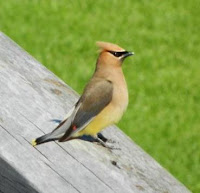There are a few ways to tell that it is spring in Edmonton. We boldly trade our parkas for shorts and blind passersby with legs so pale they practically shine. The door to the shed has defrosted enough for us to put away the shovel. We daringly put the block heater extension cord away and take the snow tires off our cars. We drink slurpees, we cry about not making the playoffs (again), and we take back the great outdoors.
And when we go outdoors, we notice the birds.
Several species of birds overwinter in Edmonton. Sparrows and chickadees, as well as the
occasional hearty (or possibly insane) nuthatch stick around and will eat from
your birdfeeder with voracious appetites when food is harder to come by and
covered in snow. Magpies and ravens are
also a common sight year-round. Spring
truly arrives in Edmonton when the large compliment of summer residents return
to the city. Within the last two weeks we have seen the arrival of bright-red
breasted robins, geese, ducks, and seagulls.
But truly a spectacular sight was the arrival of the bohemian waxwings. You have probably seen these
birds around Edmonton. They travel in
massive clouds, descending upon mountain ash and other berry-filled trees and
pick them clean before continuing. Bohemian
waxwings look very similar to cedar waxwings, and the birds usually move so
quick that it is hard to get a good look at them in order to tell who’s who. The bohemian waxwings are darker in the
front, whereas the cedar waxwings are more red/orange. Both birds are commonly seen in
the Edmonton area, if you want an excellent up-close look at them, I recommend
taking a trip out to the Devonian Botanic Gardens. I have seen flocks of cedar waxwings in the
Japanese garden there on several occasions.
 | |
| A bohemian waxwing |
 | |
| A cedar waxwing |
While the vocalizations of a single bohemian waxwing are quite soft, when you pack them into a flock of hundreds it can drown out the sound of afternoon traffic with birdsong.
I took this video of the bohemian waxwings during their brief
stop at Kitchener Park, and it captures the volume of both the birds and their
song. They are quite a sight to behold;
I hope that they pass through your neighborhood too! Enjoy.

Cool! There were approximately a million of these in the tree beside my apartment (the one that my landlord half killed) and I was wondering what they were. Thanks for enlightening me!
ReplyDeleteJody
I was actually really surprised to see them too! The trees they landed in are dutch elms, not the berry trees that waxwings usually prefer. You should see them pick a mountain ash clean, it's a total feeding frenzy! :)
Delete